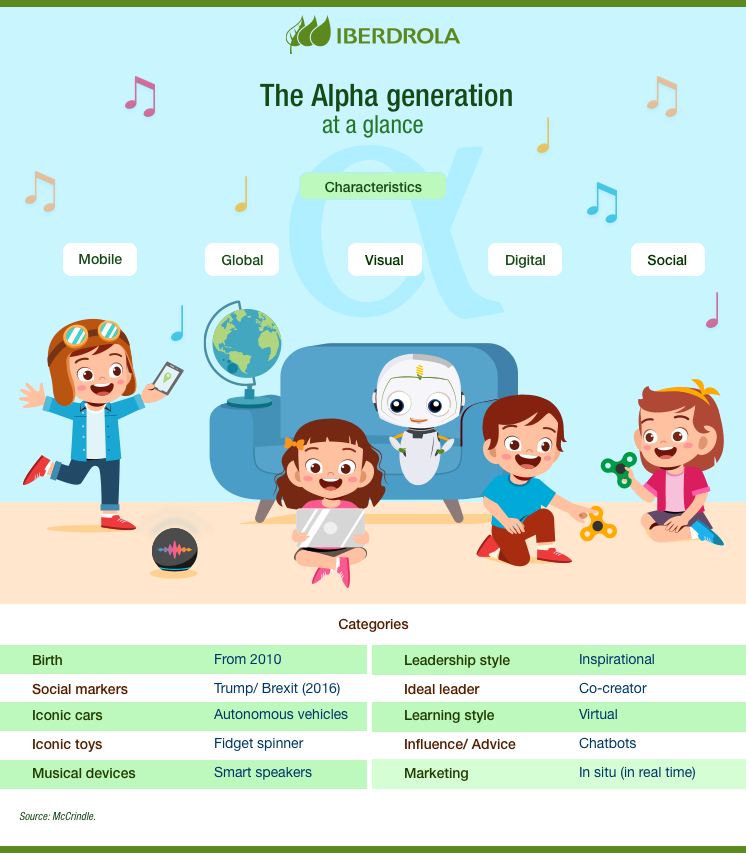Generation Alpha
Generation Alpha will lead a 100% digital world
The year 2010 saw the Alpha generation come to life, replacing the generation Z. Growing up in a digital environment, with all knowledge just a click away, will not only affect their experiences, but will define the way they interact with their peers. Here we tell you about their characteristics, the impact of digital on their development and which technologies will define them.

The technological advances that humanity has been experiencing throughout the 21st century are changing the planet and its inhabitants, both socially and economically. New technologies set our pace of life and, to a certain extent, mould our personality. Generation Alpha, the generation that will succeed generation Z, is the ultimate expression of this change and you only have to take a look at them to see for yourself: they live through screens.
What is generation Alpha
Generation Alpha includes those born from 2010 onwards and who have therefore grown up in a fully digital world. In fact, their appearance coincides with the launch of the first iPad by Apple. The term was coined by Mark McCrindle, founder of the Australian consultancy firm McCrindle Research, and he explains how it came about: "It conforms to the scientific nomenclature of using the Greek alphabet instead of the Latin alphabet and there was no point in going back to A, after all they are the first generation born fully into the 21st century and therefore they are the start of something new, not a return to the old".
Establishing when one generation ends and another begins is not an exact science, but the Pew Research Center places value on it: "It is a way of understanding how global events and technological, economic and social changes interact to define the way a set of people see the world". It is also a way of making comparisons between generations.
Experts also point out that the time between one generation and the next is shrinking because of the rapid and continuous changes the world is undergoing as a result of the digital transformation. So much so that generations are increasingly defined by the use of a technology rather than by historical or social events. This is the case of generation Alpha, who will play, learn and interact in a completely new way thanks to new technologies.
Generation Alpha and technology
Members of generation Alpha rely on technology to help them discover the world. As a result, they are not as dependent on physical contact with their peers like previous generations. According to the Understanding Generation Alpha study by Wired Consulting, "as technology develops, artificial intelligence or voice will become increasingly common methods of communication between humans and machines, as keyboards and screens give way to gesture-based interfaces and conversations between devices and humans".
Below, we review some of the technological objects that are shaping the present and will shape the future of this generation:
 Mobile devices
Mobile devices
Smartphones and tablets are already prevalent among the Alpha Generation. In fact, according to a study by Ofcom, a UK government agency, the number of children owning one of these devices is steadily growing among younger children, with tablets being particularly popular.
 Virtual assistants
Virtual assistants
Data processing algorithms will make experiences increasingly personalised and new interfaces will offer other forms of communication. The rise of virtual assistants such as Alexa or Siri, which learn from users' tastes and habits, are the best example.
 Toys and accessories
Toys and accessories
Toys with artificial intelligence, which are seen as friendly and reliable, increase the conception of what technology can do for us from childhood. Thus, later on, those items that function as accessories, wearables such as smartwatches or smartbands, will become part of their daily lives.
 Vehículos autónomos
Vehículos autónomos
The automotive industry is moving to consolidate this type of vehicle, which will reduce the number of traffic fatalities considerably. The Alpha Generation will become accustomed to driving and programming them through devices.
Returning to the Wired Consulting study, it points to the following as key to the relationship between technology and Generation Alpha: the development of technological literacy and digital intelligence along with the reduction of the digital divide, the impact on privacy as a consequence of the increase in data collection, the improvement in the personalisation of technological experiences, the conversion of voice into the interface that will rival screens, the increase in the emotional intelligence of devices, etc.

SEE INFOGRAPHIC: Generation Alpha at a glance [PDF] External link, opens in new window.
Characteristics of generation Alpha
While sharing certain traits with previous generations, especially with generation Z, the Alpha generation is very different. Below are some of its characteristics:
-
Hyperconnected. Alpha children are permanently connected. Such is their attention to new technologies that it becomes a way of life.
-
Independents. They are independent when it comes to making their own decisions and managing their digital identities, and they expect their individual needs and preferences to be taken into account.
-
Visuals. Video will be their preferred format. In addition, video games will boost their visual skills, improving eye-hand coordination and the ability to easily switch tasks.
-
Technological. Being hyper-connected, they become experts in the use of new technologies, which facilitates their digital learning and opens up a wide range of possibilities.
-
Diverse. In this case, diversity not only refers to demographics, such as ethnicity and gender, but also to tastes, lifestyles and points of view.
Problems of generation Alpha
Alpha generation children are born at a time when technological devices are getting smarter, everything is connected, and the physical and the digital are coming together. As they grow up, new technologies will become part of their lives, their experiences, their attitudes and their expectations of the world. Some neuroscientists and psychologists point out that this will have many positive consequences, but also some negative ones that do not necessarily affect everyone equally:
-
Reduced attention span and concentration. As they are used to using several screens at once and quickly scanning information, their attention span and concentration is impaired.
-
Less time for socialising. Spending much of the day online, both inside and outside the home, reduces the time for learning, playing and socialising in more traditional ways. In fact, much of socialisation is transferred to social networks.
-
Less development of creativity and imagination. Without questioning the skills that the Alpha generation will acquire thanks to new technologies, it should be stressed that as the use of physical toys is reduced, the development of imagination and creativity will suffer.
-
Reduced ability to achieve happiness. As psychologist Jean M. Twenge notes in her book iGen, there is a “link between the rise of smartphones and social media and the increase in depression, anxiety and loneliness in today's youth”.
In short, the Alphas are presented as a generation profoundly marked by new technologies and social networks, with a more uncertain future in the face of rapid political and economic change, and with the pressure to lead the fight against climate change and the transition to a more sustainable planet.




